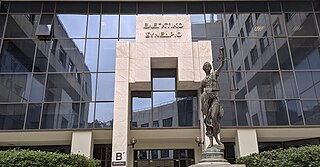Politics in Estonia takes place in a framework of a parliamentary representative democratic republic, whereby the Prime Minister of Estonia is the head of government, and of a multi-party system. Legislative power is vested in the Estonian parliament. Executive power is exercised by the government, which is led by the prime minister. The judiciary is independent of the executive and the legislature. Estonia is a member of the United Nations, the European Union, and NATO.

The Government of Pakistan, constitutionally known as the Federal Government, commonly known as the Centre, is the national authority of the Islamic Republic of Pakistan, a federal parliamentary republic consisting of four provinces, two autonomous territories and one federal territory.

The Supreme Audit Office is the supreme audit institution and also one of the oldest state institutions in Poland, created under the Second Republic on February 7, 1919, barely 3 months after the restoration of Poland's independence. It was created on the initiative of the Head of State, Józef Piłsudski. Its organisation and functioning are set out in the Constitution of the Republic of Poland and the NIK Act of 23 December 1994. The NIK is subordinate to the Sejm and it acts in accordance with the principle of collegial responsibility. The NIK is headed by the President who is appointed by the Sejm for a six-year term of office. The NIK performs audits related to, primarily, the execution of the state budget as well as public finance spending and management of public property by state and local governmental bodies and economic entities. Every year, the NIK submits three key documents to the Sejm: the analysis of the state budget execution and monetary policy guidelines, the opinion on the vote of discharge for the Council of Ministers and the annual report on the NIK’s activity.

In Greece, the Hellenic Court of Audit is the supreme audit institution of the Hellenic Republic, auditing the use of public funds in Greece according to the principles of legality, regularity and sound financial management. Synedrio is also the Supreme Financial Court, one of the three Supreme Courts of Justice, grounded on the Constitution, provides for its jurisdictional, advisory and auditing competences.

The Constitution of Latvia is the fundamental law of the Republic of Latvia. Satversme is the oldest Eastern or Central European constitution still in force and the sixth oldest still-functioning republican basic law in the world. It was adopted, as it states itself in the text, by the people of Latvia, as represented in the Constitutional Assembly of Latvia, on 15 February 1922 and came into force on 7 November 1922. It was heavily influenced by Germany's Weimar Constitution and the Swiss Federal Constitution. The constitution establishes the main bodies of government ; it consists of 116 articles arranged in eight chapters.

The Constitution of Kosovo is the supreme law of the Republic of Kosovo, a territory of unresolved political status. Article four of the constitution establishes the rules and separate powers of the three branches of the government. The unicameral Assembly of the Republic exercises the legislative power, the executive branch led by the President and the Prime Minister which are responsible for implementing laws and the judicial system headed by the Supreme Court.

The Court of Audit of Belgium is a Belgian governmental institution established by article 180 of the Belgian Constitution. The Court of Audit is a collateral body of the Belgian Federal Parliament and exerts external control on the budgetary, accounting and financial operations of the Federal State, the Communities, the Regions, the public service institutions and the provinces. The task of the Court of Audit is defined in its organic law of 29 October 1846. This law gives the Court of Audit a large independence and a wide autonomy to perform its missions.

The Court of Auditors is the supreme governmental accounting body of Spain responsible of the comptrolling of the public accounts and the auditing of the accountancy of the political parties, in accordance with the Constitution and its Organic Act.

The Court of Audit of the Republic of Slovenia is the highest body for supervising state accounts, the state budget and all public spending in Slovenia. The Constitution of Slovenia further provides that the Court of Audit is independent in the performance of its duties and bound by the Constitution and law. The Court of Audit Act also defines that the acts with which Court of Audit exercises its powers of audit cannot be challenged before the courts or other state bodies.

The Constitution of Bhutan was enacted 18 July 2008 by the Royal Government of Bhutan. The Constitution was thoroughly planned by several government officers and agencies over a period of almost seven years amid increasing democratic reforms in Bhutan. The current Constitution is based on Buddhist philosophy, international Conventions on Human Rights, comparative analysis of 20 other modern constitutions, public opinion, and existing laws, authorities, and precedents. According to Princess Sonam Wangchuck, the constitutional committee was particularly influenced by the Constitution of South Africa because of its strong protection of human rights.
Part Seven of the Constitution of Albania is the seventh of eighteen parts. Titled Normative Acts and International Agreements, it is divided into 2 chapters that consist of 8 articles.

The Office of the Comptroller and Auditor General of Bangladesh (C&AG) is the Supreme Audit Institution (SAI) of the country. Like the SAIs in many other countries across the world the institution is established by the Constitution of Bangladesh. This institute is responsible for maintaining accounts of the republic and audits all receipts and expenditure of the Government of Bangladesh, including those of bodies and authorities substantially financed by the government. The reports of the CAG are discussed by the Public Accounts Committee, which is a standing committee in the Parliament of Bangladesh.

The politics of France take place with the framework of a semi-presidential system determined by the French Constitution of the French Fifth Republic. The nation declares itself to be an "indivisible, secular, democratic, and social Republic". The constitution provides for a separation of powers and proclaims France's "attachment to the Rights of Man and the principles of National Sovereignty as defined by the Declaration of 1789".

Audit Bureau of Jordan is an independent Government agency and a supreme audit institution which is responsible for auditing the ministries, public institutions, public departments, municipalities, co-operatives, labor unions, corporations where Government of Jordan has more than 50% of their shares, and any entity the Council of Ministers may entrust the Bureau to audit its accounts.
The Ministry of Justice of the Republic of Uzbekistan,, is the central government body charged consistent implementation of a single state policy in the sphere of lawmaking and law enforcement practice in Uzbekistan.

The Board of Audit and Inspection is a national organization headquartered in Seoul, South Korea. Its primary function is the audit and inspection of the accounts of state and administrative bodies.

The Audit Chamber of Armenia is an independent agency of the government of Armenia which has separate powers and responsibilities.
Part One (Part I) is a compilation of laws pertaining to the Constitution of Albania (Albanian: Kushtetuta e Shqipërisë), that consists of fourteen articles. This part of the Constitution is the first of eighteen parts.
The Chamber of Accounts of the Republic of Azerbaijan is a supreme audit institution, the highest financial control authority of the Republic of Azerbaijan.

The Ghana Audit Service is an independent government agency in Ghana that is responsible for carrying out the audits on the accounts of the Government, Regions as well as the activities of the Ministries, Departments, Agencies and Companies under the Government of Ghana. Both the Office of the Auditor-General of Ghana and the Ghana Audit Service were established by the 1992 Constitution of Ghana. Internationally, the equivalent of the Ghana Audit Service is referred to as the Supreme Audit Institution (SAI). The International Organization of Supreme Audit Institutions (INTOSAI) is the international board that oversees and creates benchmark for auditing public entities for all Supreme Audit Institutions including Ghana who are also members.














